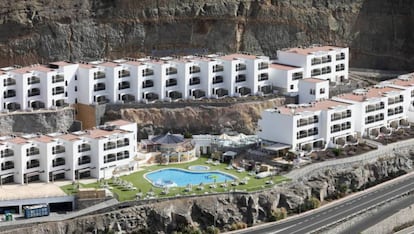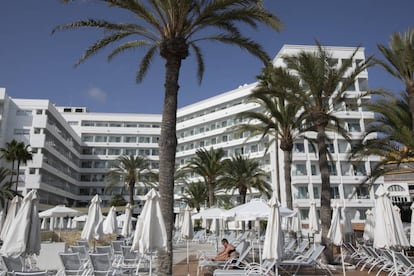Thomas Cook collapse deals massive blow to tourism in Spain’s Canaries
The fall of the British travel giant is already being felt on the islands, with many hotels near-empty and jobs at risk


“Thank you, gracias, danke schön,” the singer at Hotel Sentido Gran Canaria Princess says to scattered applause. The hotel has more than 400 rooms, but the occupants of just 15 tables are listening as he performs classic hits from yesteryear. The song Marmor, Stein und Eisen – a 1960s hit by the German singer Drafi Deutscher – is more enthusiastically received than Neil Diamond’s Sweet Caroline. It confirms a comment made by one of the waiters: “Seventy percent of customers came from [British travel group] Thomas Cook. There are practically no English [customers] left, and no more are coming.” Now the German visitors have taken over, and they like Drafi Deutscher.
The big drama is the issue of connecting flights. We do not have the AVE or highways here
Nicolás Villalobos, managing director of beCordial Hotels & Resorts
The impact of the collapse of the British tour giant Thomas Cook, which ceased activity last Monday, can be seen in other ways. Now there’s no need for hotel guests to reserve the poolside lounges with their beach towels before going for breakfast. From morning to night, couples and groups gather in front of the tour-provider areas to find out how they will be transferred to the airport so they can return to their countries. The information is put up on notices, and no employees are to be seen.
On Monday, buses are scheduled to take a hundred British hotel guests to the airport, where they will be flown back to Birmingham, Gatwick, Manchester and Bristol on repatriation flights that the British government was forced to organize after the collapse of Thomas Cook.
The fall of the British travel giant has affected the 600,000 people who had bought or booked vacations with the company, including the 150,000 British tourists who were left stranded because of the collapse. It has also led to 21,000 job losses, and has painted a very dismal picture for the countries that have been the most popular destinations of Thomas Cook customers. Spain’s Canary Islands, where high season lasts from October until Easter, have been hardest hit by the fall. “It leaves us with very little capacity to respond,” says Francisco Moreno, the head of communication of the hotel chain Lopesan, which manages 17 establishments in the Canary Islands.

The British travel group paid hotels and transportation companies in the region within 90 days, which could jeopardize many companies’ summer income, especially those that are more reliant on Thomas Cook’s business. What’s more, all reservations made with the tour operator for the upcoming weeks are gone. One in four foreign tourists (around 3.4 million a year) were brought to the Canary Islands by the British tour operator, according to hotel association ASHOTEL and the hotel federation FEHT, which indicates the scale of the problem.
Moreno is confident that other tour operators will be quick to fill the gap left by Thomas Cook, but he says the main problem is the collapse of Thomas Cook’s airlines: “On their [Thomas Cook] planes, there were also passengers who had packages with other tour operators, which can no longer send their customers to us,” he explains.
I think the market is going to have the capacity to immediately fill a large part of what has been lost
UGT labor union spokesperson José Ángel Ramírez
It’s a concern shared by Nicolás Villalobos, the managing director of the hotel chain beCordial Hotels & Resorts, which received between 20% and 25% of its guests from Thomas Cook. “The big drama, beyond the commercial fall [of Thomas Cook], is the issue of connecting flights. We do not have the [high-speed rail network] AVE or highways here. There’s no alternative. The flights are our highways to the European continent,” he says.
The tourism sector in the Canary Islands is wary of the ripple effect the collapse of Thomas Cook could have on the industry. The British group’s best-known German subsidiary, Neckermann, has collapsed as well. But Thomas Cook’s Condor airline is continuing to operate thanks to a bailout from the German government. Swedish travel company Ving, which is also owned by Thomas Cook is also still running flights. It is good news for the Canary Islands, where more than two-thirds of rooms for the next season have been booked by the Scandinavian market.
Impact on jobs
Workers in the Canary Islands are worried about how the collapse of Thomas Cook will affect their jobs. “Last week we were full, and now look,” says Lorenzo Naranjo, a multilingual waiter at the restaurant La Ciudadela in the seaside promenade of Playa del Inglés beach, pointing at the empty tables. “Not even one English person,” he says. “There are five waiters and this work could be done with just three.”
José Ángel Ramírez, a spokesperson from the labor union UGT, is urging calm. “Having 25% of the market does not mean 25% of jobs will be lost. I think the market is going to have the capacity to immediately fill a large part of what has been lost.”
The regional premier of the Canary Islands, Ángel Víctor Torres, said on Saturday that companies affected by the collapse of Thomas Cook could temporarily postpone their Social Security contributions as a way of protecting jobs.
How well hotels are able to bounce back in time for the next season will depend on how dependent they were on Thomas Cook. Local tourism owes a lot to large tour companies – streets have even been named after the travel giants In the town of Maspalomas in Gran Canaria. The hotel Mirador de Atlántico, in Amadores beach, for instance, worked exclusively with Thomas Cook. On Thursday, only around 20 of the 118 hotel rooms were booked, forcing the owners to move the remaining guests to another establishment and close down the hotel. They hope to reopen when Scandinavian clients arrive within two weeks. In the meantime, staying open means losing money.
English version by Melissa Kitson.
Tu suscripción se está usando en otro dispositivo
¿Quieres añadir otro usuario a tu suscripción?
Si continúas leyendo en este dispositivo, no se podrá leer en el otro.
FlechaTu suscripción se está usando en otro dispositivo y solo puedes acceder a EL PAÍS desde un dispositivo a la vez.
Si quieres compartir tu cuenta, cambia tu suscripción a la modalidad Premium, así podrás añadir otro usuario. Cada uno accederá con su propia cuenta de email, lo que os permitirá personalizar vuestra experiencia en EL PAÍS.
¿Tienes una suscripción de empresa? Accede aquí para contratar más cuentas.
En el caso de no saber quién está usando tu cuenta, te recomendamos cambiar tu contraseña aquí.
Si decides continuar compartiendo tu cuenta, este mensaje se mostrará en tu dispositivo y en el de la otra persona que está usando tu cuenta de forma indefinida, afectando a tu experiencia de lectura. Puedes consultar aquí los términos y condiciones de la suscripción digital.








































